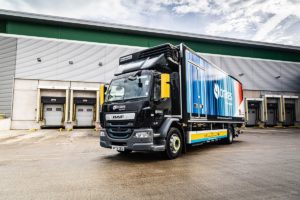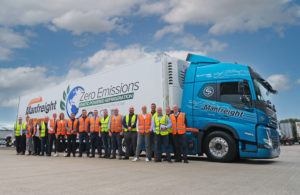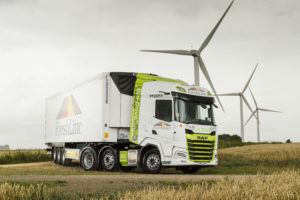As operators in the temperature-controlled transport sector look to decarbonise their businesses and electrify their fleets, the most forward-thinking of them are adopting the latest technologies in order to stay ahead of the competition.
At the same time, truck manufacturers, refrigeration unit makers and bodywork specialists are providing customers with an increasingly sophisticated range of renewable refrigeration solutions to help transport firms reduce the environmental impact of their operations.
For example, Northern Ireland’s Manfreight recently took delivery of the first Schmitz Cargobull S.KOe COOL to transport goods including pharmaceuticals and raw food products to its large customer base across the UK and Ireland.
The fully electric semi-trailer will be paired with a Volvo FM Electric, providing the business with a 100% zero emission solution for its temperature-controlled division.
This emission-free semi-trailer, which is fully type approved, comes equipped with an all-electric refrigeration unit with integrated power electronics, a high-voltage battery and an axle generator.
Its electrically powered S.CU ep85 refrigeration unit is designed for emission-free cooling and heating of the load.
In addition, it offers a cooling capacity of up to 15,800 watts and a heating capacity of 10,500 watts.
Batteries on the support winch replace the diesel tank, and also offer the option of installing an additional pallet box with space for 36 pallets.
Schmitz Cargobull’s electrified trailer axle recuperates energy during braking, among other things, and therefore extends the operating time of the refrigeration machine or reduces the recharging times of the battery via the power grid.
Chris Slowey, Managing Director at Manfreight, said the trailer is also extremely quiet, enabling deliveries in urban areas in the early morning hours as well as in the late evening.
“Working in tandem with the Volvo FM Electric, we can now offer our customers a completely electric transport combination”, he added.
“It’s a major commitment and a clear sign that we are incredibly serious about our ambitious target to run an emission-free operation by 2045.
“While the trailer is moving, it is effectively powering itself. It’s a really fascinating piece of technology.”
Meanwhile, Spalding-based Freshlinc has taken delivery of 60 Carrier Transicold Vector-equipped temperature-controlled trailers, alongside two new tractor units mounted with Eco-Drive systems, as part of its ambition to reduce the carbon footprint of its commercial vehicle fleet.
These 40 new multi-temperature Vector HE 19 and 20 mono-temperature Vector 1550 systems are fitted to 13.6-metre Gray & Adams trailers.
The Vector HE 19 MT combines Carrier’s E-Drive all-electric technology with a new multi-speed engine design to cut fuel consumption by up to 30%, while operating 3 dB(A) quieter when compared to the previous generation Vector 1950 MT units.
Also, using the electric architecture of Carrier’s E-Drive technology, the Vector 1550 provides excellent pull-down speeds and accurate set-point control, both of which are essential for Freshlinc’s frozen or chilled food deliveries.
Both Vector products integrate smoothly with Carrier’s Eco-Drive power module that powers the refrigeration units via the truck’s engine and helps reduce fuel usage and delivers emissions savings.
Built into the chassis of the tractor unit, it uses a hydraulic pump connected to the truck engine’s power take-off to drive a generator capable of delivering the electrical power required to run any of Freshlinc’s Carrier-cooled trailer units.
This power is delivered independent of the truck’s engine speed, ensuring 100% refrigeration capacity even when the vehicle is idling.
Andrew Marchant, Fleet Director at Freshlinc, said: “Achieving Net Zero is a key pillar of Freshlinc’s business plan, and we see Carrier Transicold as a vital partner in helping us reach that goal.
“These products mark the next step in our sustainability journey and one that we hope will help continue to steer us toward a greener future.”
Also, national foodservice supplier, Brakes has put into service its first zero-emissions DAF LF Electric, for multi-temperature operations out of the company’s depot in Reading.
The 19-tonne vehicle includes dual-compartment bodywork, supplied and installed by Solomon Commercials, and an ‘FK2’ refrigeration unit from Frigoblock to provide two-zone temperature control; frozen at the front, and chilled at the rear of the body.
Its FK2 unit draws energy directly from the battery pack.
DAF, Solomon and Frigoblock all worked closely to ensure the vehicle delivers an approximate 8-tonne payload potential, matching the figure achieved by Brakes with its 18-tonne GVW diesel-powered DAF LF 260 vehicles.
The LF Electric, designed and built at Leyland Trucks in Lancashire, is powered by an electric motor developing 250kW nominal power and nominal torque of 1,200Nm.
Also, DAF’s latest LFP batteries, which contain no cobalt or magnesium, provide a gross energy content of 282kWh to give the vehicle a single charge range of 280km.
Brakes has a fleet of more than 1,500 vehicles and its parent company, Sysco, is committed to end diesel truck acquisitions by 2030 through a programmed move to a low-carbon fleet with electrification as the primary drive system.
Paul Vernon, Head of Fleet at Brakes, said: “We’re excited by the potential of the new DAF LF Electric, we’ve worked closely with DAF, Solomon Commercials and Frigoblock, and the result is a truck with an exacting specification.
“The distribution sector is starting to embrace zero-emissions, and we’re confident the new DAF gives us the right solution to provide productivity benefits.”
Supermarket Asda has also put into service a refrigerated electric home delivery vehicle, based on a Maxus Deliver 9 chassis cab and modified by Paneltex, operating out of its Watford depot.
In addition to its fully electric operation and GAH refrigeration system, the van includes a 111-tote capacity across ambient, refrigerated, and frozen zones, a central locking system, and both front and rear parking sensor/reverse aid systems.

“Each electric vehicle we’ve produced has taken the industry a step closer to zero-emission cold chains. I’m really very pleased that we’re at the forefront of that movement toward greener options.”
As responsible businesses looking to minimise their carbon footprint, we are likely to see many more temperature-controlled transport operators adopt such technologies in the months and years ahead.










